Sissi: The Fateful Years of an Empress is a autrichien film of genre Drama directed by Ernst Marischka released in france in DVD on 7 november 2002 with Romy Schneider
Sissi: The Fateful Years of an Empress (1957)
Sissi - Schicksalsjahre einer Kaiserin

If you like this film, let us know!
Release in DVD in france 7 november 2002
Length 1h46
Directed by Ernst Marischka
OriginAustria
Rating66%










Sissi – Fateful Years of an Empress (Sissi – Schicksalsjahre einer Kaiserin) is a 1957 film directed by Ernst Marischka and starring Romy Schneider, Karlheinz Böhm, Magda Schneider, Gustav Knuth and Josef Meinrad, costumes by Gerdago (Gerda Gottschlich). It was entered into the 1958 Cannes Film Festival. It is the last film in the Sissi trilogy, following Sissi (1955) and Sissi – The Young Empress (1956). The director Ernst Marischka planned a fourth film, but Schneider refused to play Sissi any longer.
[...]See more...
Synopsis
The Austrian empress Elisabeth, nicknamed Sissi, enjoys travelling in Hungary. She welcomes the politically valuable friendship of Count Andrássy, but when he confesses he is in love with her, she returns to Vienna lest the relationship become too intimate. Her time in Hungary is only a temporary relief from the frustrations of court life in Vienna, where dutiful Franz Josef remains at his desk and allows his strict, domineering mother Sophie to interfere in the raising of his daughter with Sissi, Sophie.[...]See more...
Actors

Romy Schneider
(Empress Elisabeth)

Karlheinz Böhm
(Emperor Franz Joseph)

Magda Schneider
(Duchess Ludovika)

Gustav Knuth
(Duke Max)

Josef Meinrad
(Major Böckl)
Trailer of Sissi: The Fateful Years of an Empress
Bluray, DVD
Comments
Leave comment :
Suggestions of similar film to Sissi: The Fateful Years of an Empress
There are 142 films with the same actors, 8 films with the same director, 70156 with the same cinematographic genres (including 30 with exactly the same 4 genres than Sissi: The Fateful Years of an Empress), 7796 films with the same themes (including 429 films with the same 2 themes than Sissi: The Fateful Years of an Empress), to have finally 70 suggestions of similar films.If you liked Sissi: The Fateful Years of an Empress, you will probably like those similar films :

Sissi (1955)
, 1h42Directed by Ernst Marischka
Origin Austria
Genres Drama, Comedy, Comedy-drama, Romance
Themes Politique, Théâtre, Political films, Films based on plays, Films about royalty
Actors Romy Schneider, Karlheinz Böhm, Magda Schneider, Gustav Knuth, Josef Meinrad, Uta Franz
Rating70%





Princess Elisabeth, nicknamed "Sissi", is the second oldest daughter of Duke Maximilian Joseph in Bavaria and Princess Ludovika of Bavaria. She is a carefree, impulsive and nature-loving child. She is raised with her seven siblings at the family seat Possenhofen Castle on the shores of Lake Starnberg in Bavaria. She has a happy childhood free of constraints associated with her royal status.
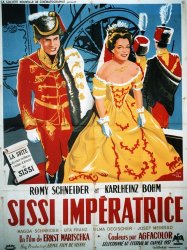
Sissi: The Young Empress (1956)
, 1h47Directed by Ernst Marischka
Origin Austria
Genres Drama, Comedy, Comedy-drama, Romance
Themes Political films, Films about royalty
Actors Romy Schneider, Karlheinz Böhm, Magda Schneider, Gustav Knuth, Josef Meinrad, Vilma Degischer
Rating66%





Sissi slowly adapts to life as empress of Austria, but her mother-in-law is hard to live with. Archduchess Sophie adheres to the long-established rules protocol and etiquette, and constantly interferes not only with the emperor's government of the empire but in his family life as well. When Sissi's first child is born, the Archduchess Sophie insists on taking away the child to raise her, because she feels Sissi is too young and unqualified to do so. Sophie also feels that Sissi's place is not in the nursery with her baby, but with her husband as the emperor travels around the empire.
[...]See more...
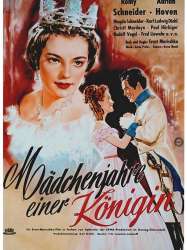
The Story of Vickie (1954)
, 1h58Directed by Ernst Marischka
Origin Austria
Genres Drama, Comedy, Romantic comedy, Historical, Romance
Themes Political films, Films about royalty
Actors Romy Schneider, Adrian Hoven, Magda Schneider, Peter Weck, Karl Ludwig Diehl, Christl Mardayn
Rating64%





After her Prime Minister Lord Melbourne arranges a marriage for her with the German Prince Albert, the young Queen Victoria decides to leave London and spend some time in Kent. While there she meets a handsome young German and falls in love, unaware that he is her intended husband Albert.

Mam'zelle Cricri (1955)
, 1h35Directed by Ernst Marischka, Karl Ehrlich
Origin Austria
Genres Drama, Comedy, Musical theatre, Musical, Romance
Actors Romy Schneider, Magda Schneider, Gretl Schörg, Adrienne Gessner, Hans Moser, Paul Hörbiger
Rating59%





Vers 1900, Constanze Hubner, jeune paysanne du Tyrol, vient à Vienne chez sa tante Thérèse, boulangère de l'Empereur François-Joseph. Un quiproquo permet à Constanze d'assister à un bal costumé où le baron Felix Zahndorf la confond avec une authentique comtesse et la demande en mariage.
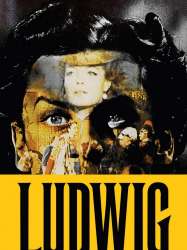
Ludwig (1973)
, 4h45Directed by Luchino Visconti
Origin Italie
Genres Drama, Biography, Historical
Themes Films about music and musicians, Politique, Films about sexuality, LGBT-related films, Films about classical music and musicians, Musical films, Political films, LGBT-related films, Films about royalty, LGBT-related film
Actors Helmut Berger, Trevor Howard, Silvana Mangano, Sonia Petrovna, Romy Schneider, Gert Fröbe
Rating74%





Évocation de la vie de Louis II de Bavière, depuis son couronnement à l'âge de dix-huit ans et demi jusqu'à son internement et sa mort à quarante. On y découvre la complicité presque amoureuse qui le lie à sa cousine Sissi (la jeune impératrice d'Autriche-Hongrie) qui est à deux doigts de parvenir à lui faire épouser sa sœur Sophie malgré le peu d'attirance qu'il a pour celle-ci, son entichement déraisonnable pour la musique de Richard Wagner, dont il devient le très généreux mécène au point de lui faire construire un opéra, les circonstances qui l'amènent à céder aux penchants qui lui seront funestes : son goût du rêve, du post-romantisme, des garçons (son palefrenier devenant son chambellan et homme de confiance très intime), des châteaux de contes de fées, pour l'édification desquels il dépense des fortunes et dans lesquels il fuira les dures réalités de son temps (à savoir : l'irrésistible unification allemande autour de la Prusse de Bismarck qui vassalise tous les autres royaumes ou principautés germaniques, Bavière y compris) en s'imaginant, entouré d'une garde rapprochée de serviteurs, qu'il est encore vrai roi en son royaume.
[...]See more...

The Last Train (1973)
, 1h35Directed by Pierre Granier-Deferre
Origin France
Genres Drama, War, Historical, Romance
Themes Transport films, Rail transport films, Political films, Histoire de France, L'Occupation allemande en France, La condition juive en France sous l'Occupation allemande, Film se déroulant dans un train
Actors Jean-Louis Trintignant, Romy Schneider, Maurice Biraud, Régine, Nike Arrighi, Serge Marquand
Rating68%





In May 1940 a packed train takes refugees from a French village near the Belgian border away from the advancing German forces.. On it are Julien, a short-sighted radio repairer, and his pregnant wife and daughter. The women are given priority in a carriage at the front while he has to scramble into a cattle truck at the rear. There he is struck by a mysterious and beautiful young woman on her own.
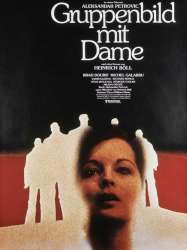
Group Portrait with a Lady (1977)
, 1h47Directed by Aleksandar Petrović
Origin France
Genres Drama, Historical, Romance
Themes Political films
Actors Romy Schneider, Brad Dourif, Michel Galabru, Vadim Glowna, Richard Münch, Milena Dravić
Rating57%





De 1936 à 1966, trente ans de la vie tumultueuse de Léni Gruyten née en 1922, à travers l'Allemagne nazie et la Seconde Guerre mondiale.

Shakespeare in Love (1998)
, 2h3Directed by John Madden
Origin USA
Genres Drama, Biography, Comedy, Comedy-drama, Romantic comedy, Historical, Romance
Themes Films about writers, Films about sexuality, Films about suicide, Films about television, Théâtre, LGBT-related films, Transgender in film, Musical films, Romeo and Juliet, Political films, Films based on plays, Films based on works by William Shakespeare, LGBT-related films, Films about royalty, LGBT-related film, Cross-dressing in film
Actors Joseph Fiennes, Gwyneth Paltrow, Geoffrey Rush, Colin Firth, Ben Affleck, Tom Wilkinson
Rating70%





In 1593 London, William Shakespeare is a sometime player in the Lord Chamberlain's Men and poor playwright for Philip Henslowe, owner of The Rose Theatre. Shakespeare is working on a new comedy, Romeo and Ethel, the Pirate's Daughter. Suffering from writer's block, he has barely begun the play, but starts auditioning players. Viola de Lesseps, the daughter of a wealthy merchant, who has seen Shakespeare's plays at court, disguises herself as "Thomas Kent" to audition, then runs away. Shakespeare pursues Kent to Viola's house and leaves a note with the nurse, asking Thomas Kent to begin rehearsals at the Rose.
[...]See more...
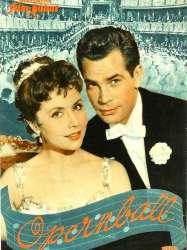
Bal à l'Opéra (1956)
, 1h35Directed by Ernst Marischka
Origin Austria
Genres Comedy, Musical
Themes Films about music and musicians, Musical films, Operetta films
Actors Johannes Heesters, Josef Meinrad, Sonja Ziemann, Adrian Hoven, Fita Benkhoff, Theo Lingen
Rating63%





C'est le bal de l'opéra de Vienne. Des hommes demandent à Georg Dannhauser toutes les sortes d'excuses pour passer inaperçus auprès des leurs femmes présentes au bal. Paul Hollinger est venu avec sa femme Hélène et son ami Georg, il prétend posséder des commerces. Eduard von Lamberg, l'oncle de Georg, feint une maladie et demande un médecin, en fait il veut se rendre au bal. De même, Georg prétexte du travail, pour voir en secret son amante Mizzi.
 , 1h37
, 1h37Directed by Alexander Korda
Origin United-kingdom
Genres Drama, Biography, Comedy, Comedy-drama, Historical, Romance
Themes Politique, Political films, Films about capital punishment, Films about royalty
Actors Charles Laughton, Robert Donat, Merle Oberon, Elsa Lanchester, John Loder, Binnie Barnes
Rating69%





The film begins 20 years into King Henry's reign. In May 1536, immediately following the execution of his second wife, Anne Boleyn (Merle Oberon), King Henry VIII (Charles Laughton) marries Jane Seymour (Wendy Barrie), who dies in childbirth eighteen months later. He then weds a German princess, Anne of Cleves (played by Laughton's real-life wife Elsa Lanchester). This marriage ends in divorce when Anne deliberately makes herself unattractive so she can be free to marry her sweetheart. (In an imaginative and high-spirited scene, Anne "wins her freedom" from Henry in a game of cards on their wedding night).
[...]See more...
 Connection
Connection